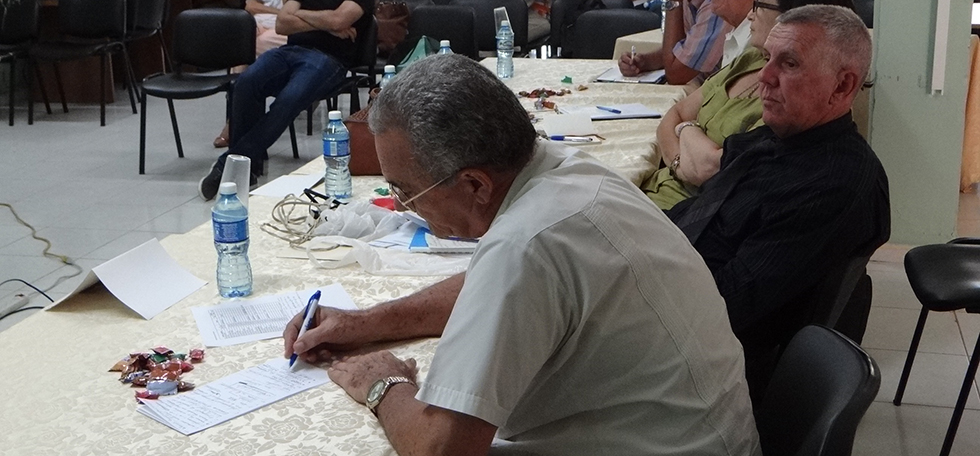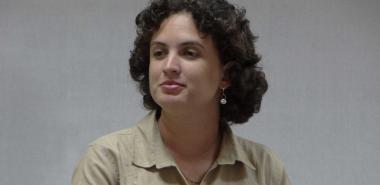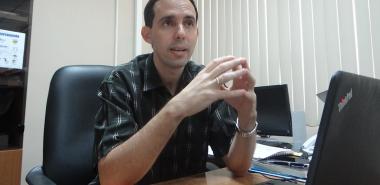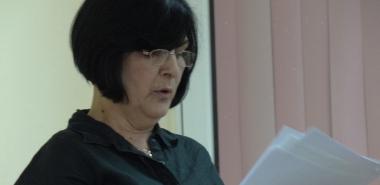Members of one of the boards of the doctoral program in computer science. Ph.D. Juan Pedro Febles, first on the left. Photo: Archive.
About the accreditation of doctorates, Ph.D. Febles Rodríguez comments.
The evaluation processes for accreditation in higher education in Cuba began in the late 1990s when, based on some experiences in the application of the Self-Assessment Guide of the Ibero-American Graduate Association (AUIP) ) To master's programs, it was decided by the leadership of the Ministry of Higher Education (MES) to create a system that would suit the realities of our country.
In this way, the first version of the Master Program Evaluation System with its Regulation, Quality Pattern and Evaluation Guide was born, joining later that of university courses, both of which were integrated into the University System of Programs Of Accreditation , most recently incorporated into the System of Evaluation and Accreditation of doctoral programs and the Institutional Evaluation System.
To know the details about the accreditation of the doctoral programs, about this process in our house of high studies, from the Mella newspaper we dialog with Ph.D.Juan Pedro Febles Rodríguez, who is the secretary of the doctoral committee at the University of Informatics Sciences (known as UCI),
Variables that are taken into account.
The quality standard for the doctoral programs is identified with an ideal model to which the quality of the doctoral training processes evaluated should be approached and corresponds to the Cuban experience in the training of Ph.D. programs and to the international theory and practice of Quality assessment in higher education.
The Ministry of Education accredits the doctoral training programs that are developed in all the universities of the country according to that standard of quality.
In order to achieve the above objectives, the quality standard of the doctoral evaluation and accreditation system includes the following variables:
Training of doctors.
Scientific level of the staff.
Material, financial and administrative support.
Management of information and knowledge.
Impact.
Doctors Training Program.
The Program, in addition to the results achieved in scientific production and the training of doctors, has had a notable impact on the creation of a solid university culture in doctoral scientific education, which has been fostered in the intense exchange between the members of this and the doctors who systematically participate in the workshops.
One of the most transcendental needs to be covered is the identification and solution of scientific problems of a theoretical and practical order needed in the computerization of Cuban society. The way to fulfill this task is centered in achieving a close articulation with the research forms by projects from which research topics of the departments and the network of centers of the university are generated.
Scientific level of the staff.
There are several strengths. The staff is composed of 23 doctors, among which three are consultant professors , eight members of permanent boards of scientific degree, three professors of merit and 15 with the teaching category of full professors.
In addition, its members possess the high capacity, academic and investigative authority, which make it worthy of recognition within the University and throughout the country.
Material resources available for development.
The material resources available to the institution are made available to the program and time is provided for the performance of certain research tasks of the applicants.
In the university there is a strategy of information and knowledge management that supports the doctoral training process, materialized in the Center of Scientific and Technical Information, through which concrete actions are executed that are taxed to the process, reflected in the bibliographic assurance and access to information.
Results obtained
Given the systematicity and completeness of the training process, several results have been achieved that have raised the quality of the Doctorate in Information Technology of the institution, among them are: 100% of the defenses approved in the first presentation in the national court of automatic and 96% by unanimous vote of the court. Of the registered candidates have already successfully defended 25, noting that six defended ahead of schedule due to the quality of their investigations and high degree of dedication.
Impacts of the program
By measuring the quality of the program's results, although its complete evaluation has not been completed, Febles Rodríguez said that encouraging data such as:
Graduates of the program occupy higher responsibilities and consolidate themselves as scientific leaders in their fields of action.
The results of doctoral theses have an impact on social practice, as they provide solutions to prioritized problems in the country (Impact and relevance).
The graduated doctors feel made by the acquired training and by the acknowledgments they have achieved as a result of their scientific production.
Several graduates have been incorporated as professors into the doctoral program and actively participate in scientific seminars.
Thesis results are applied and published in high impact scientific journals.
Ph.D. Febles also added that the external evaluation should be carried out in the first half of 2017, despite being a relatively young program in the university, which has as a direct antecedent a program for the scientific training specialized in information technology, created in the 2011, aimed at young people with results in technical tasks and with possibilities to develop a doctorate in Cuba.






